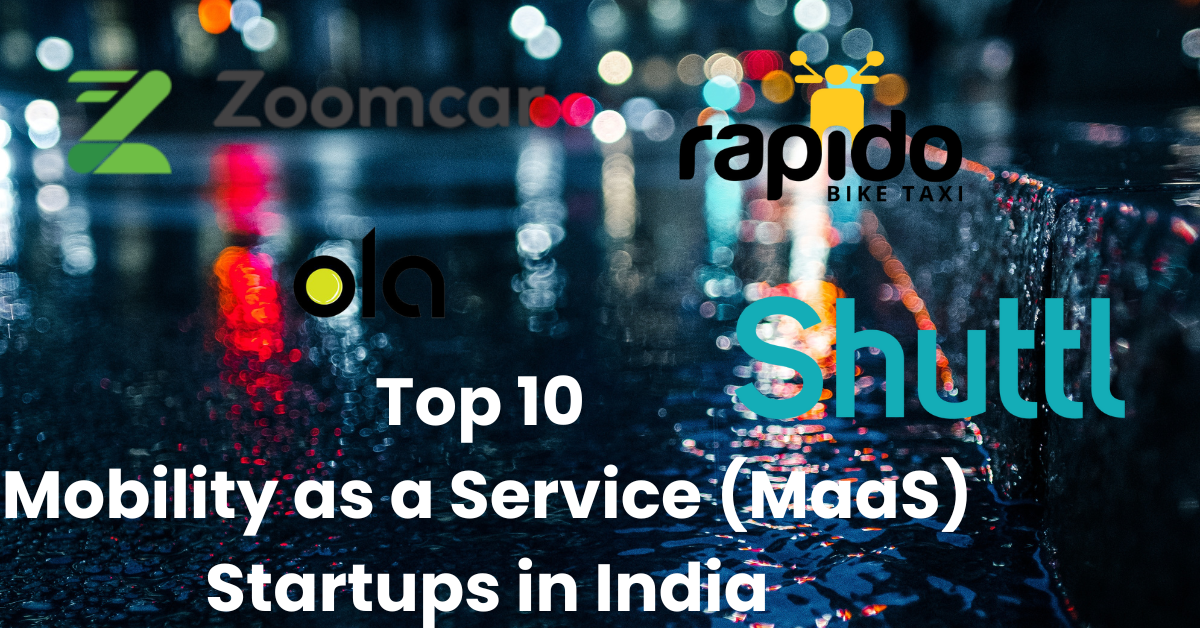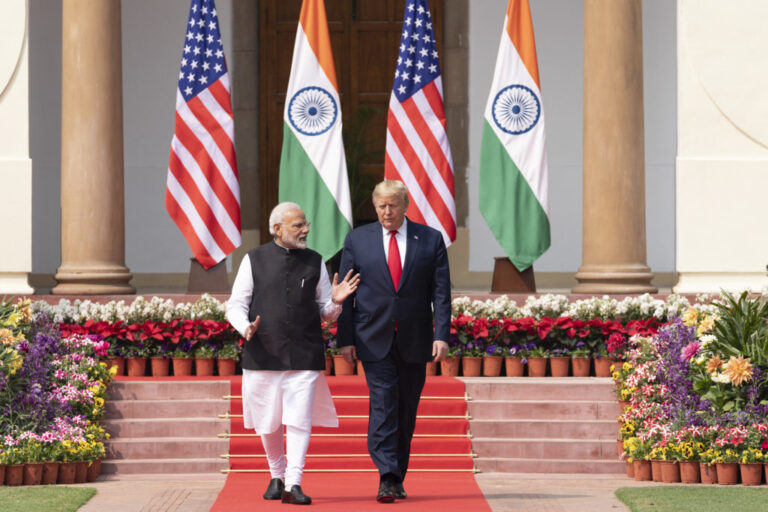Top 10 Mobility as a Service (MaaS) Startups in India
Discover the Top 10 Mobility as a Service (MaaS) Startups in India revolutionizing urban transport. Explore innovative platforms integrating ride-hailing, bike-sharing, and electric vehicles for sustainable and seamless city mobility solutions.
Mobility as a Service (MaaS) represents a paradigm shift in urban transportation, emphasizing convenience, efficiency, and sustainability. It integrates various modes of transport—such as ride-hailing, bike-sharing, public transit, and more—into a unified, user-centric platform accessible via mobile apps. MaaS aims to simplify travel for commuters by offering seamless planning, booking, and payment options across different transport services. In India, MaaS startups are playing a crucial role in addressing urban mobility challenges, including congestion, pollution, and inadequate public transport infrastructure, by promoting shared mobility solutions and integrating electric vehicles. These startups are reshaping how people move around cities, enhancing accessibility while reducing environmental impact.
Table of Contents
1. Ola:
Founded in 2010 by Bhavish Aggarwal and Ankit Bhati, Ola has become synonymous with ride-hailing in India. Operating from Bengaluru, Karnataka, Ola offers a comprehensive range of transportation services including cabs, auto-rickshaws, bikes, and electric vehicles (EVs). The platform integrates public transport options, making it a one-stop solution for urban commuters. Ola has expanded its footprint with initiatives like Ola Electric, focusing on sustainable mobility solutions and contributing to reducing carbon emissions in cities across India.
| Aspect | Details |
|---|---|
| Founders | Bhavish Aggarwal, Ankit Bhati |
| Founded | 2010 |
| Location | Bengaluru, Karnataka |
| Overview | Ola offers ride-hailing services for cabs, auto-rickshaws, bikes, and electric vehicles. It integrates public transport options into its app. |
Ola, founded in 2010, has grown into one of India’s leading ride-hailing platforms, offering a wide range of services including cabs, auto-rickshaws, bikes, and electric vehicles (EVs). In addition to its core ride-hailing services, Ola has ventured into electric mobility with initiatives like Ola Electric, aiming to revolutionize urban transportation with sustainable solutions. The company also integrates public transport options into its app, providing users with comprehensive mobility choices.
Also read: Top 10 BioTech Startups in India
2. Uber:
Established in 2009 by Garrett Camp and Travis Kalanick in San Francisco, Uber has grown to be a global leader in ride-hailing services, including its operations in India. Uber India, headquartered in Gurugram, Haryana, offers a variety of transportation options such as cars, bikes, and auto-rickshaws through its user-friendly app. The company emphasizes enhancing user convenience and integrating more sustainable transport choices like electric vehicles. Uber continues to innovate and collaborate with local authorities to improve urban mobility in Indian cities.
| Aspect | Details |
|---|---|
| Founders | Garrett Camp, Travis Kalanick |
| Founded | 2009 |
| Location | San Francisco, California, USA (Uber India HQ in Gurugram, Haryana) |
| Overview | Uber provides ride-hailing services including cars, bikes, and auto-rickshaws. It focuses on enhancing user convenience and integrating more sustainable transport options. |
Uber, a global pioneer in ride-hailing services, has established a significant presence in India. It offers various transportation options such as cars, bikes, and auto-rickshaws through its user-friendly app. Uber has been focusing on enhancing user convenience and promoting sustainable mobility by integrating more electric vehicles and partnering with local governments to improve urban transport infrastructure.
Also read: Top 10 Renewable Energy Startups in India
3. Rapido:
Rapido, founded in 2015 by Aravind Sanka, Pavan Guntupalli, and Rishikesh SR and based in Bengaluru, Karnataka, specializes in bike taxi services. It addresses the challenge of last-mile connectivity in congested urban areas by providing a quick and cost-effective mode of transport. Rapido’s app-based platform allows users to book rides on motorcycles, offering a flexible alternative to traditional transportation methods and contributing to reducing traffic congestion.
| Aspect | Details |
|---|---|
| Founders | Aravind Sanka, Pavan Guntupalli, Rishikesh SR |
| Founded | 2015 |
| Location | Bengaluru, Karnataka |
| Overview | Rapido specializes in bike taxi services, offering a quick and cost-effective mode of transport for short distances in cities. |
Rapido, launched in 2015, has carved a niche in India’s urban transport sector with its bike taxi service. Targeted primarily at short-distance commuters, Rapido provides a cost-effective and efficient mode of transport through its app. The startup addresses the last-mile connectivity challenge in congested cities, aiming to reduce traffic congestion and travel time for users.
Also read: Top 10 WaterTech Startups in India
4. Bounce:
Originally launched as Wicked Ride in 2014 and later rebranded as Bounce, this Bengaluru-based startup founded by Vivekananda Hallekere and Varun Agni operates a pioneering dockless bike-sharing service. Bounce allows users to rent bikes through its app and drop them off at any location within the city, promoting flexibility and convenience in urban travel. The startup has expanded its fleet to include electric scooters, focusing on sustainable mobility solutions and reducing the carbon footprint of urban transportation.
| Aspect | Details |
|---|---|
| Founders | Vivekananda Hallekere, Varun Agni |
| Founded | 2014 (as Wicked Ride), rebranded as Bounce in 2018 |
| Location | Bengaluru, Karnataka |
| Overview | Bounce operates a dockless bike-sharing service, allowing users to rent and drop off bikes anywhere in the city. It has expanded to include electric scooters. |
Bounce has innovated in the bike-sharing segment by introducing a dockless system where users can rent and drop off bikes anywhere in the city via its app. Founded as Wicked Ride in 2014 and rebranded as Bounce, the company has expanded its fleet to include electric scooters, promoting eco-friendly urban mobility solutions. Bounce focuses on improving accessibility and reducing urban congestion through its flexible rental model.
Also read: Top 10 Waste Management Startups in India
5. Vogo:
Founded in 2016 by Anand Ayyadurai and Padmanabhan Balakrishnan and headquartered in Bengaluru, Vogo offers dockless scooter rentals on an hourly basis. The startup integrates its services with metro stations and other transport hubs, enhancing first-mile and last-mile connectivity for commuters. Vogo’s focus on providing affordable and eco-friendly transport options aligns with its commitment to sustainable urban mobility, making it a popular choice among city dwellers in India.
| Aspect | Details |
|---|---|
| Founders | Anand Ayyadurai, Padmanabhan Balakrishnan |
| Founded | 2016 |
| Location | Bengaluru, Karnataka |
| Overview | Vogo offers dockless scooter rentals on an hourly basis and integrates its services with metro stations and other transport hubs for improved connectivity. |
Vogo has made its mark in India’s shared mobility space by offering dockless scooters for rent on an hourly basis. Since its inception in 2016, Vogo has integrated its services with public transport hubs such as metro stations, enhancing first-mile and last-mile connectivity for commuters. The startup is committed to expanding its electric vehicle fleet and promoting sustainable transport options across cities.
Also read: Top 10 GreenTech Startups in India
6. Yulu:
Yulu, established in 2017 by Amit Gupta, RK Misra, and Naveen Dachuri and based in Bengaluru, operates a network of electric bicycles and scooters aimed at promoting eco-friendly urban mobility solutions. The startup focuses on dockless systems, allowing users to rent vehicles for short trips via its app. Yulu has partnered with city authorities to implement sustainable transportation initiatives, contributing to reducing traffic congestion and pollution in Indian cities.
| Aspect | Details |
|---|---|
| Founders | Amit Gupta, RK Misra, Naveen Dachuri |
| Founded | 2017 |
| Location | Bengaluru, Karnataka |
| Overview | Yulu operates a network of electric bicycles and scooters for short trips, promoting eco-friendly urban mobility solutions. It focuses on dockless systems and partnerships with city authorities. |
Yulu has emerged as a key player in promoting sustainable urban mobility through its network of electric bicycles and battery-powered scooters. Founded in 2017, Yulu focuses on providing affordable and eco-friendly transport solutions for short trips within cities. The startup has partnered with municipal authorities to implement dockless bicycle sharing systems, contributing to reducing carbon emissions and traffic congestion.
Also read: Top 10 SpaceTech Startups in India
7. Drivezy:
Drivezy, founded in 2015 by Ashwarya Singh and Hemant Sah and headquartered in Bengaluru, offers a peer-to-peer car and bike sharing platform. The startup enables individuals to rent vehicles directly from private owners through its app, promoting a sharing economy model. Drivezy has diversified into long-term vehicle leasing and is exploring options with electric vehicles to cater to evolving consumer preferences for sustainable and cost-effective mobility solutions.
| Aspect | Details |
|---|---|
| Founders | Ashwarya Singh, Hemant Sah |
| Founded | 2015 |
| Location | Bengaluru, Karnataka |
| Overview | Drivezy offers a peer-to-peer car and bike sharing platform, enabling users to rent vehicles from private owners. It has diversified into long-term leasing and electric vehicles. |
Drivezy has revolutionized the concept of vehicle rental in India with its peer-to-peer car and bike sharing platform. Established in 2015, Drivezy allows individuals to rent vehicles directly from private owners through its app, promoting a sharing economy model. The startup has diversified into long-term vehicle leasing and is exploring electric vehicle options to cater to evolving consumer preferences for sustainable mobility.
Also read: Top 10 Mobility as a Service (MaaS) Startups in India
8. Zoomcar:
Launched in 2013 by Greg Moran and David Back and based in Bengaluru, Zoomcar revolutionized self-drive car rentals in India. The startup allows users to book cars by the hour, day, week, or month through its app, emphasizing flexibility and convenience in urban travel. Zoomcar has expanded its fleet to include electric vehicles, supporting eco-friendly transport alternatives and promoting clean mobility solutions across Indian cities.
| Aspect | Details |
|---|---|
| Founders | Greg Moran, David Back |
| Founded | 2013 |
| Location | Bengaluru, Karnataka |
| Overview | Zoomcar pioneered self-drive car rentals in India. It offers flexibility in booking cars by the hour, day, week, or month through its app, with a focus on expanding its electric vehicle fleet. |
Zoomcar introduced the concept of self-drive car rentals in India, offering users the flexibility to book vehicles by the hour, day, week, or month through its app. Since its inception in 2013, Zoomcar has expanded its fleet to include electric vehicles, aiming to reduce carbon footprint and promote clean mobility solutions. The startup is also exploring subscription-based models to enhance user convenience.
Also read: Top 10 Cyber Defense Startups in India
9. Mobycy:
Founded in 2017 by Akash Gupta and headquartered in Gurugram, Mobycy focuses on promoting eco-friendly urban transport through its dockless bicycle sharing services. The startup allows users to rent bicycles on demand via its app, facilitating short-distance travel and reducing reliance on motor vehicles. Mobycy collaborates with urban planners and local authorities to integrate its services with smart city initiatives, contributing to sustainable urban mobility solutions.
| Aspect | Details |
|---|---|
| Founders | Akash Gupta |
| Founded | 2017 |
| Location | Gurugram, Haryana |
| Overview | Mobycy promotes eco-friendly urban transport through dockless bicycle sharing services. It collaborates with urban planners to integrate with smart city initiatives. |
Mobycy focuses on promoting eco-friendly transportation options through its dockless bicycle sharing services. Launched in 2017, Mobycy allows users to rent bicycles on demand via its app, facilitating short-distance travel while reducing reliance on motor vehicles. The startup collaborates with urban planners and local authorities to integrate its services with smart city initiatives, aiming to improve urban mobility and reduce pollution.
Also read: Top 10 Legal Services Startups in India
10. Shuttl:
Established in 2015 by Amit Singh and Deepanshu Malviya and based in Gurugram, Shuttl offers app-based shuttle bus services tailored for daily commuters. The startup optimizes routes based on demand patterns, providing a comfortable and reliable alternative to traditional public transport. Shuttl aims to reduce congestion and pollution in urban areas by promoting shared mobility solutions that cater specifically to the needs of regular commuters in Indian cities.
| Aspect | Details |
|---|---|
| Founders | Amit Singh, Deepanshu Malviya |
| Founded | 2015 |
| Location | Gurugram, Haryana |
| Overview | Shuttl offers app-based shuttle bus services designed for daily commuters. It optimizes routes based on demand patterns, aiming to reduce congestion and pollution in urban areas. |
Shuttl addresses the challenges of urban commuting by offering app-based shuttle bus services designed for daily commuters. Founded in 2015, Shuttl optimizes routes based on demand patterns, providing a comfortable and reliable alternative to traditional public transport. The startup focuses on reducing congestion and pollution in cities by promoting shared mobility solutions that cater specifically to the needs of daily commuters.
Also read: Top 10 Remote Work Startups in India
Frequently Asked Questions(FAQ’s) about – Top 10 Mobility as a Service (MaaS) Startups in India
1. What is Mobility as a Service (MaaS)?
Mobility as a Service (MaaS) refers to a concept where various forms of transport services are integrated into a single platform accessible via smartphones. Users can plan, book, and pay for their journeys using a single app, which may include options like ride-hailing, bike-sharing, public transport, and more.
2. How are MaaS startups contributing to urban mobility in India?
MaaS startups in India are transforming urban mobility by offering convenient, flexible, and often eco-friendly transport options. They address issues such as last-mile connectivity, congestion reduction, and environmental sustainability by promoting shared mobility and integrating electric vehicles into their fleets.
3. What are the advantages of using MaaS services?
- Convenience: Users can access multiple transport options through a single app, simplifying travel planning and payment.
- Cost-effective: MaaS promotes cost-effective travel solutions, especially for short distances or daily commutes.
- Environmental benefits: By integrating electric vehicles and promoting shared rides, MaaS contributes to reducing carbon emissions and urban pollution.
- Improved urban mobility: MaaS helps optimize transport networks, reducing congestion and improving overall traffic flow in cities.
4. How do MaaS startups ensure user safety and security?
MaaS startups implement various measures to ensure user safety, including:
- Driver/partner verification: Background checks and verification of drivers/partners.
- In-app safety features: Emergency buttons, real-time GPS tracking, and trip-sharing options.
- Customer support: 24/7 customer support for addressing any safety concerns or emergencies.
5. Are MaaS services available in all cities in India?
While MaaS startups primarily operate in major cities like Bengaluru, Delhi-NCR, Mumbai, and Hyderabad, their services are gradually expanding to cover more urban areas. Startups often prioritize cities with high population density and demand for convenient transport solutions.
6. How are MaaS startups integrating with public transport systems?
Many MaaS startups collaborate with public transport authorities to integrate bus, metro, and train schedules into their apps. This integration allows users to plan multimodal journeys seamlessly, combining different modes of transport for optimal routes and timings.
7. What role do electric vehicles (EVs) play in MaaS startups?
Electric vehicles are increasingly becoming a focus for MaaS startups in India due to their environmental benefits and lower operational costs. Startups like Ola, Vogo, and Yulu have integrated electric scooters and bicycles into their fleets, promoting sustainable transport options and reducing carbon footprint.
8. How do MaaS startups handle peak demand periods?
To manage peak demand, MaaS startups employ dynamic pricing models (surge pricing) and incentives for drivers/partners. They also optimize fleet management and scheduling to ensure sufficient availability during high-demand periods, such as rush hours or special events.
9. Are there subscription or loyalty programs offered by MaaS startups?
Some MaaS startups offer subscription models or loyalty programs where frequent users can benefit from discounted fares, priority booking, or exclusive offers. These programs aim to enhance user retention and encourage regular use of their services.
10. What are the future trends for MaaS startups in India?
Future trends for MaaS startups in India include:
- Expansion to smaller cities: Increasing coverage beyond major metros to tier 2 and tier 3 cities.
- Integration of AI and IoT: Enhancing user experience with predictive analytics, smart routing, and real-time data insights.
- Focus on sustainability: Continued adoption of electric vehicles and partnerships for eco-friendly initiatives.
- Regulatory compliance: Adapting to evolving regulatory frameworks and policies for urban mobility and transportation.
Conclusion
These MaaS startups in India are at the forefront of transforming urban transportation by offering innovative solutions that cater to diverse mobility needs while promoting sustainability. With their emphasis on integrating new technologies, expanding vehicle options, and enhancing user convenience, these startups are poised to shape the future of urban mobility in India and beyond.
Also read:
Top 10 BioTech Startups in India
Top 10 Renewable Energy Startups in India
Top 10 WaterTech Startups in India
Top 10 Waste Management Startups in India
Top 10 GreenTech Startups in India
Top 10 SpaceTech Startups in India
Top 10 Mobility as a Service (MaaS) Startups in India
Top 10 Cyber Defense Startups in India
Top 10 Legal Services Startups in India
Top 10 Remote Work Startups in India
Last Updated on: Saturday, July 6, 2024 12:04 pm by News Week India Team | Published by: News Week India Team on Wednesday, June 26, 2024 9:39 pm | News Categories: Trending







